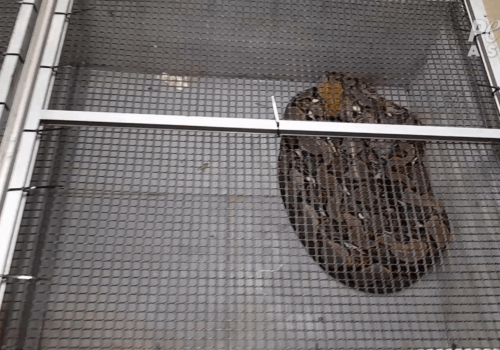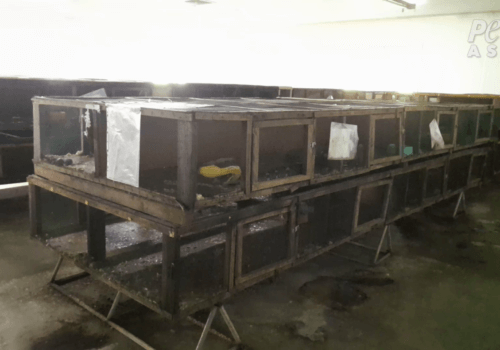In never-before-seen footage, a PETA Asia investigation into the exotic-skins industry in Thailand reveals that thousands of snakes are cruelly confined and then bashed over the head with hammers and impaled with hooks while still moving. The two python farms that PETA Asia’s investigators visited supply skins to Caravel, a tannery owned by fashion conglomerate Kering – the parent company of Gucci, Yves Saint Laurent, and other brands.
PETA Asia also visited a facility where crocodiles are stabbed with a metal blade and continue to move while workers tear off their skin – just to make bags, shoes, belts, and other accessories that are sold around the world.
Kering is supporting the immense suffering and horrifically violent death of animals as long as it allows its brands to sell python, crocodile, and other exotic skins.
Watch the video footage and use the form below to speak up on behalf of animals.
Sick Pythons, Filthy Living Conditions
In nature, pythons warm themselves in the sun, climb trees, swim, and explore extensive ranges. On the two python farms that PETA Asia’s investigators visited – Closed-Cycle Breeding International (CCBI) and Sisatchanalai Python Farm – workers kept snakes in small, barren boxes and cages, some of which were filled with faeces.
To maximize output, employees at CCBI bred female pythons with three or four different male pythons in one breeding season. The owner admitted that some pythons die as a result of fighting with each other during the breeding season.
CCBI’s owner, during a tour of his father’s facility, Sisatchanalai Python Farm, directed an investigator’s attention to an emaciated snake, noting that he or she likely “didn’t eat for a long time” and that “they should get rid of it … it’s better to kill [the snake]”. The owner also said that another snake who hadn’t shed properly – causing their scales to become stuck to their eyes – should be killed.
The owner of Sisatchanalai Python Farm told an investigator that in addition to Caravel, he sells skins to Gucci and Louis Vuitton.
Pythons Bashed With Hammers and Impaled With Hooks
The investigators documented that workers pin struggling pythons down by the neck and bash them over the head with a hammer before driving metal hooks through their head. To make their skins easier to remove, workers inflate the snakes with water, even as they continue to move. According to Dr Clifford Warwick, a reptile expert who reviewed the footage, it’s likely that most of the animals were conscious during this horrifically painful process. The snakes were then skinned.
CCBI’s owner claimed that his workers put pythons in a chilled room for one day before slaughtering them, but there’s no scientific evidence that imposed hypothermia (intentionally causing a reduction in core temperature) has any meaningful effect on reducing sensitivity or awareness in snakes.
According to the owner, at the time of the investigation, CCBI confined some 15,000 pythons at a massive factory-farm operation – one of the largest that PETA Asia has investigated. It slaughters approximately 2000 snakes during its busy season, typically killing 20 to 30 pythons a day. The owner told an investigator about the farm’s contract with Caravel to supply it with 5000 skins in 2024.
Kering’s Complicity in Snakes’ Suffering
Despite indisputable documentation of abuse at facilities that supply Kering with exotic skins – including PETA Asia’s 2021 investigation into an Indonesian slaughterhouse that provides Gucci with lizard skins – the company continues to tout its Animal Welfare Standards, which specify that animals must have “room to move around freely” and be “managed to promote good health and treated immediately should disease or injury be discovered”. The standards also require “humane handling at end of life”. Claims of upholding these standards were proved false by PETA Asia’s investigations.
Workers Stabbed Crocodiles and Skinned Them Alive
PETA Asia investigators also visited Thailand’s Phokkathara Crocodile Farm and Live Show.
This farm’s owner claimed to possess 4000 crocodiles. These reptiles are kept in barren enclosures containing murky pits of water instead of being free to explore swamps, sun themselves, and raise their young as they would in nature. The filthy pools are breeding grounds for disease, and being kept in close confinement can prompt aggression among the stressed animals.
A worker employed a crude “nape stab” method to kill a crocodile, attempting to sever the spinal cord and likely causing extreme pain and a slow, agonising death. The animal’s legs continued to move for at least 23 minutes after the worker violently thrust a metal blade into his or her neck. Scientific evaluation suggests that crocodiles may remain alive and conscious for over an hour and a half after enduring such injuries.
Make a Difference for Snakes and Crocodiles Right Now!
PETA India and PETA entities around the world have repeatedly exposed the cruelty in the exotic-skins trade on three continents, which includes pumping snakes full of compressed air and scrambling alligators’ brains with metal rods.
Please don’t support this suffering. Never buy anything made of the skin of animals. There are so many humane and eco-friendly vegan materials available today, and there’s no excuse for continuing to wear or sell exotic skins.
YOU CAN HELP!
“Humane standards” are meaningless and nothing more than an excuse to continue the cruel abuse and killing cycle. Every accessory made from the skins of reptiles represents enormous pain and suffering for these complex animals, who just want to be left alone.
Please join our call: Tell Kering to stop selling anything made from the skins of pythons and other animals through Gucci, Yves Saint Laurent, and all its other brands.

